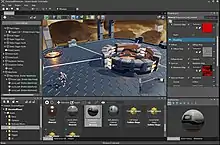 Logo of Stride | |
| Stable release | 4.1
/ 16 July 2022 |
|---|---|
| Repository | github |
| Written in | C# |
| Operating system | Creation |
| Available in | English |
| Type | Game engine |
| License | MIT License (as of Xenko 3.0); prior to Xenko 3.0: GNU GPLv3 (engine) and proprietary (editor) |
| Website | stride3d |
Stride (formerly Xenko and Paradox) is a free and open-source 2D and 3D cross-platform game engine originally developed by Silicon Studio. It can be used to create video games for PC, mobile devices and virtual reality.
Stride, then called Xenko, was originally made available by Silicon Studio under a dual-license model, available to anyone under GNU GPLv3, with alternative, for-pay license terms available for those for whom the GPL's copyleft terms are a barrier to adoption.[1] On August 2, 2018, developer Virgile Bello announced on the Xenko blog that Silicon Studio had dropped support of the project and relicensed Xenko 3.0 under the MIT License. Unlike the prior dual-license arrangement whereby the engine was available as free and open-source software but the editor remained proprietary, under the new arrangement both the engine and the editor are available under the MIT License.[2]
Functionalities
Stride is a C# suite of tools to create games. It is also a full game engine with a customizable shader system intended for virtual reality game development. Its main tool is the Game Studio, a fully integrated environment that allows the user to import assets, create and arrange scenes using an Entity component system, assign scripts, build and run games. The game engine features a Physically-Based Rendering (PBR) layered material editor, photorealistic postprocess effects, and tools such as a particle editor, a scene streaming system, a full tool-chain a sprite editor, a scripting editor and a UI engine. Additionally, it supports a nested prefab and archetype systems scaling along all editors and assets. Stride is also a cross-platform runtime supporting iOS, Android, Windows UWP, Linux, and PlayStation 4. It creates Visual Studio projects, allowing for easy scripting and debugging.
It can be used to create video games for PC and mobile devices,[3] and virtual reality.[4][5]
Stride is also used as 3D rendering engine for the visual programming environment vvvv gamma.[6]
Features include:
- Open source
- High-end realistic rendering
- Physically based rendering
- Light probes support
- Skin, hair and cloth rendering
- Real-time local reflections
- Photorealistic post effects
- Virtual reality ready
- Customizable rendering pipeline with customizable shader system
- Scalability
- Asynchronous background asset loading
History

The engine was first named Paradox and was then renamed Xenko. Xenko is taken from the Japanese word zenko which means perfection and light.[7] It was renamed Stride in 2020.[8]
Xenko's first public release, Alpha 1.0, was in September 2014.[9] It went open-source as Xenko on GitHub in October 2014.[10] A scene editor and physically based rendering (PBR) material editor were announced in March 2015[11] and released in April 2015.[12]
Xenko beta version 1.8x was released out of beta in February 2017.[13]
On March 1, 2017, Microsoft announced that Xenko would be included in their Xbox Creators Program[14] and Major Nelson reported that Xenko would be one of the supported game engines with "out of the box" support for UWP.[15]
In April 2017, Silicon Studio launched Xenko 2.0 under a commercial proprietary license.[1]
In August 2018, Silicon Studio launched Xenko 3.0 and announced the end of their support for the engine, shifting to a community-supported model.[2]
On May 31, 2019, Silicon Studio open sourced their Starbreach Demo code and assets.[16]
On November 11, 2019, Xenko version 3.1 was released.[17]
In April 2020, the engine was renamed to Stride because the developers wanted the engine to join the .NET Foundation, and since the name Xenko was property of Silicon Studio it could not be done.[8]
In February 2021, Stride 4.0 was released.[18]
In July 2022, Stride 4.1 was released.[19]
References
- 1 2 "Silicon Studio launches mobile and VR game engine Xenko after two years in beta". pocketgamer.biz. Retrieved 2017-04-26.
- 1 2 Virgile Bello. "Xenko Game Engine - Xenko 3.0 is now free and open-source!". xenko.com. Retrieved 2018-08-02.
- ↑ "Bravely Default developer Silicon Studio moves into game engines with open-source Xenko platform". VentureBeat. 2017-04-25. Retrieved 2017-04-26.
- ↑ "Xenko Game Engine: A New Way To Develop Better VR Games". VRFocus. Retrieved 2017-04-26.
- ↑ "Xenko Game Engine Launches with Free Edition". VRFocus. Retrieved 2017-04-26.
- ↑ "3d Graphics | vvvv gamma documentation". thegraybook.vvvv.org. Retrieved 2022-03-27.
- ↑ "Paradox renamed. Welcome Xenko Game Engine!". 80.lv. 2015-12-02. Retrieved 2020-11-05.
- 1 2 "Stride Game Engine - Xenko has been renamed to Stride". stride3d.net. Retrieved 2020-11-03.
- ↑ "Stride Game Engine - Xenko 1.0 Alpha is out!". stride3d.net. Retrieved 2020-11-05.
- ↑ "Open sourcing, new platforms and more". xenko.com. 17 October 2014. Retrieved 18 March 2016.
- ↑ "Scene Editor and New Advanced Rendering presented at GDC". 5 March 2015. Retrieved 18 March 2016.
- ↑ "Xenko 1.1.0β: Scene Editor, PBR and PostFX". 28 April 2015. Retrieved 18 March 2016.
- ↑ "Silicon Studio releasing Xenko Engine". GamesIndustry.biz. 23 February 2017. Retrieved 2020-11-03.
- ↑ "Xbox Live Creators Program". 10 March 2017. Retrieved 10 March 2017.
- ↑ "New Investments For Xbox Developers And Gamers Kick Off GDC 2017". Major Nelson. 2017-03-10. Retrieved 2017-03-10.
- ↑ "Xenko Game Engine - Starbreach Demo". xenko.com. Retrieved 30 March 2020.
- ↑ "Xenko Game Engine - Xenko 3.1 released!". xenko.com. Retrieved 30 March 2020.
- ↑ Bello, Virgile (1 February 2021). "Stride 4.0 is now live!". Stride. Archived from the original on 1 February 2021. Retrieved 16 February 2021.
- ↑ Jorn, Aggror (16 July 2022). "Stride 4.1 is now live!". Stride Game Engine. Archived from the original on 22 July 2022. Retrieved 22 July 2022.